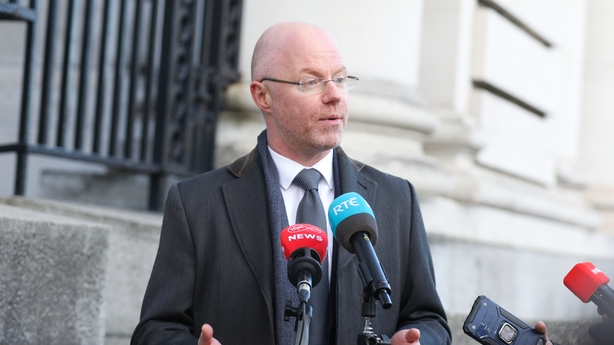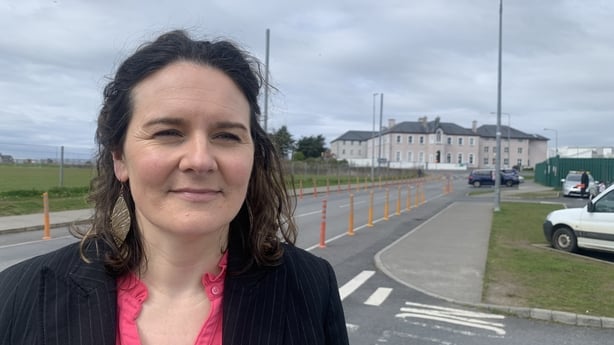No decision has been made regarding legislative changes to the State's abortion law, Taoiseach Leo Varadkar has said in the Dáil.
An independent review of the Regulation of Termination of Pregnancy has recommended that the Health Service Executive undertakes a mapping exercise to ascertain the precise number of medical practitioners providing abortion services nationwide.
A report by Dr Marie O'Shea says there is uneven geographic coverage of primary care providers, with fewer contracts between the HSE and primary care providers recorded in the southeast, northwest, midlands and border counties.
It says the HSE should conduct a geospatial mapping exercise to measure the furthest distance a woman of reproductive age must travel to access a providing medical practitioner.
The report recommends that in areas where there is low coverage and women must travel longer distances to access care, the Department of Health and the HSE should consider supporting the establishment of local women's health centres, providing comprehensive women's healthcare services.
"These could be led by an obstetrician/gynaecologist or a GP with special interest in women’s health," it said.
"Such a model would enable GPs who are interested in providing the service (but are unable to do so due to lack of peer support from practice colleagues) carry out sessions at a different location."
There are an estimated 422 providers of termination of pregnancy services in primary care.
The report also states that there is uneven geographic coverage of hospitals providing full services under the Act with 11 of 19 maternity units or hospitals providing full services.
It is expected that a further four hospitals will commence providing full services this year.
Read more:
Abortion services recommendations to be implemented - Taoiseach
Taoiseach 'reluctant' to make major changes to abortion legislation
'Unacceptable' lack of hospital abortion services - Donnelly
The reason for non-participation by hospitals has been attributed by the HSE and the Department of Health to the prevalence of conscientious objection among medical practitioners, according to the report.
It says there is "a dearth of information" relating to GPs' reasons for not providing termination of pregnancy services.
The research indicates that the main reason may be attributed to "excessive workloads" as well as a lack of hospital back up.
It recommends that to address barriers associated with GPs' responsibilities, the Department of Health should support Irish College of General Practitioners initiatives to achieve their target of increasing the number of GPs by 1,800 by 2028, to take the national target to 6,000, which would represent 4,000 GPs.
It says that not all GPs are aware of their legal and ethical obligations under the Act and under the Irish Medical Council Guide to Ethical Conduct and Behaviour to make arrangements for the transfer of the care of the pregnant woman so she may avail of termination of pregnancy services.

'Contentious issue'
It describes the statutory requirement that informed consent may only be given after at least three days have elapsed from the date of the first consultation as "a contentious issue".
"Whilst there is perceived benefit to having a period of reflection to ensure that the decision is not made in haste and later regretted, it is perceived by others as an infringement on their personal reproductive autonomy," the report said.
It points out that termination of pregnancy services are not configured to run 365 days a year, which means the three-day wait can extend to a four or five day wait for treatment if the first visit takes place towards the end of the week, particularly if it coincides with public holidays.
This is compounded by the need to complete terminations before the pregnancy exceeds 12 weeks according to the report, and it can be particularly problematic for marginalised and vulnerable service users where organising multiple appointments may be challenging.
"The mandatory waiting period can impose a physical and psychological burden on women," it said.
Decline in women travelling abroad
The main findings include the number of terminations carried out in the jurisdiction since services began in January 2019 and 31 December 2022.
In total, there were 17,820 pregnancy terminations - 17,510 of those did not exceed 12 weeks.
The number of terminations of pregnancies where there was a risk to life or health, risk to life or health in an emergency, and condition likely to lead to the death of the foetus, "have remained relatively low and static" according to the research.
The data indicates that there has been a decline in the number of women who have travelled abroad for abortion care since January 2019.
Most of those who are travelling to the UK are in the later stages of gestation and the abortions are being provided where the pregnancy has not exceeded its 24th week and the continuance of the pregnancy would involve risk, greater than if the pregnancy were terminated, of injury to the physical and mental health of the pregnant person.
They are also being provided where there is substantial risk that if the child were born it would suffer from such physical or mental abnormalities.
Dr O'Shea recommends the enactment of legislation for safe access zones and protection of service users and providers by criminalisation of conduct which intentionally or would reasonably be regarded as having the effect of influencing a person’s decision to have a termination of pregnancy or provide the service.
Health Committee to consider amendments
The Oireachtas Health Committee will be considering any amendments to the law, as proposed in the review of the legislation, the Taoiseach has said.
A free vote for Fine Gael and Fianna Fáil TDs will be granted, Mr Varadkar told the Dáil.
He was responding to Áontú leader Peadar Tóibín, who told members that he believed that parts of the legislation, such as the mandatory three-day waiting period, were under threat of being removed.
Mr Varadkar told Mr Tóibín that he was "jumping the gun".
This morning, Minister for Health Stephen Donnelly said the committee would be asked to examine the legislative changes recommended in the abortion review.
He said some are straightforward but others are "more sensitive like the three-day waiting time".
In response to a question from Sinn Féin Spokesperson on Health David Cullinane, the minister said he would welcome "solid reasoned discussion from the health committee".
Mr Cullinane told Mr Donnelly that "ultimately the Government has to make the decisions".
"We can advise or make or observations," he said. "It is a political call which has to be made."
Speaking to RTÉ's Drivetime later, Mr Cullinane said he welcomes the abortion review and suggested mapping out the geographical issues outlined to provide bespoke local or regional women's health hubs to provide services.
He said that there were still barriers to women accessing the service and that politicians have "a duty to give people what they voted for".

'Passionate views'
Speaking on RTÉ's News at One, Minister for Health Stephen Donnelly has said he expects the same debate on the abortion review report as was seen during the repeal the eighth referendum with passionate views on both sides.
He described the report as useful, and said that it had operational recommendations which are sensible things to make the service more accessible and safer for women and easier for healthcare professionals, which he said was his ultimate goal.
Minister Donnelly said that his clear priority was making these healthcare services accessible, safe and good for women in Ireland as possible while being aware that when the country voted to repeal, there were criteria that people understood including these three days.
On the time it will take for potential changes, he said that it depends on how long the report is with the Health Committee.
"What I want to do is give the committee the time it feels it needs," he said. "I just can't give an exact timeline now."
On the mandatory three day waiting period, he said he was conscious that he was referring this to the Oireachtas Health Committee and that it is a sensitive issue, there are people acting in good faith on both sides.
"In my role I want to make sure that debate can happen and that I don’t unduly influence an Oireachtas Health Committee that I’m only today referring this to them," he said.
On the difference in regional services, he said over 420 GPs were providing the service, which was a 50% increase on pre-Covid numbers, but he would like to see more.
"In most parts of the country the service is robust," he said.
He said that some counties with a handful of GPs providing the service was not sustainable.
On the terms of terms of employment in such areas and the suggestion that there should be an obligation that they provide the service, he said that this was something that would require a legislative amendment to make it mandatory, and this would be considered by the Health Committee.
Any medical professional can conscientiously object, even if this is in their job description.
Minister Donnelly said that 11 of the 19 hospital maternity units providing the service was "not acceptable", adding that Government wanted to get this figure to 17 by the end of the year and all 19 should be providing the services by early next year.
The Irish Family Planning Association says the comprehensive, evidence based analysis creates a clear political imperative to strengthen abortion services and secure abortion care into the future.
Its Chief Executive Niall Behan has called on the Government and the Oireachtas to "act promptly to ensure the harms, delays and barriers that currently impede access to abortion care are addressed, through both legislative and operational reforms".

The Pro Life Campaign has said it will strongly oppose any attempts to give effect to the recommendations contained in the report.
Spokesperson Eilís Mulroy said the recommendations, if given effect, would represent a total departure from the basis on which people voted in the 2018 referendum.
"The Government should focus on looking for ways to reduce Ireland’s soaring abortion rate rather than looking at scrapping the three-day reflection period before an abortion happens or considering fully decriminalising abortion effectively permitting it up to nine months," she said.
Additional reporting Sinead Spain, Tommy Meskill






